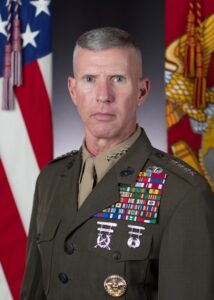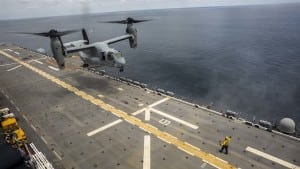The top Marine Corps officer ordered a safety review in the wake of a MV-22B Osprey crash that killed three Marines and injured several others.
“Marines, when we have any training mishap, we must conduct a thorough and harsh review of our processes to confirm that our culture of safety is still strong,” acting Marine Corps commandant Gen. Eric Smith said in a Tuesday service message.

Smith said “safety is a key element of our warrior culture. When we lose Marines, we are not only heartbroken, but we are also less ready for combat.”
Therefore, he said he is ordering a “unit level review of our culture of safety to be completed no later than 15 September 2023.”
Three Marines died and five more were hospitalized when an Osprey crashed on Melville Island, off the coast of Northern Australia on Aug. 27. The aircraft held 20 people on board.
Smith said he expects each unit to gather at the appropriate level to discuss elements of what it means to be a professional organization related to safe conduct of events from training through combat.
“Safety is not a peacetime concern; it is a warfighting issue,” he continued.
Smith said the Marine Corps will use the review to ensure Joint Light Tactical Vehicle (JLTV) operators have the proper rest before a movement, that proper Personal Protective Equipment is worn at any range, “and that a thorough review of any mission is conducted for ALL hands before we cross the line of departure.”
The notice specified commanders and supervisors at all levels are to review units’ attitudes regarding safety, examine risks of the operational environment and review ways and means to mitigate risks “to an acceptable level.”
By Oct. 15 the commanders are ordered to submit the feedback to the Commandant of the Marine Corps Safety Division.
The notice said discussions should specifically review a mishap or scenario applicable to each unit, with the focus “on the conditions leading to the mishap, and what might have been done to prevent the conditions that caused or contributed to the mishap. All opinions are important, not just those of leadership. “
Examples that units will use include the 2020 Amphibious Assault Vehicle (AAV) mishap for a Marine Expeditionary Unit (MEU)/Amphibious Operations and other examples “across type, model, series in the aviation community.”
Smith noted this review will not pause training and operations or berate specific officials, but discuss how to improve safety.
“We will continue to train realistically for combat, full stop. We can, we must, and we will conduct that training from a start point of risk being reduced to the maximum extent possible. The hours we spend in this review is our chance to discuss HOW we will do this. It is not a venue for lectures, or for wagging our finger at a Marine or a command. I know every Marine is committed to the safety of every other Marine, and I know that you balance real world readiness with safe training. These two things are never mutually exclusive, and can be done simultaneously.”

“The motivation to provide me with high quality recommendations lies in the names of Marines who cannot participate due to being lost in mishaps,” he continued.
Beyond the Osprey crash, there have been two other deadly mishaps in the past month: a pilot was killed when an F/A-18D Hornet crashed near Marine Corps Air Station Miramar, Calif., shortly after taking off during a training exercise late on Aug. 24 and a service member was killed during a live training exercise on Aug. 17 at Camp Pendleton, Calif.
During a press gaggle on Aug. 28, Pentagon Press Secretary Brig. Gen. Pat Ryder told reporters that he was not aware of any Osprey stand downs or groundings given several Osprey crashes this year.
“We need to allow time for the investigation to take its course. I’m not aware of any service activity as it relates to any kind of messages in terms of potential stand-downs or anything like that. Again, we need to look at the data here and look at each situation and judge it on its own merits. But of course, safety is always going to be a priority when it comes to aircraft and aviation and operations,” he said.